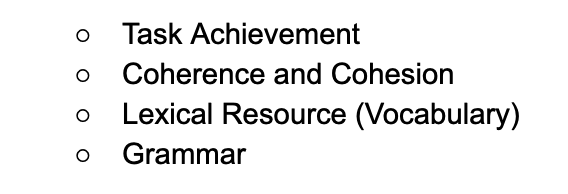IELTS Writing Task 2 – Academic and General

The IELTS Writing Task 2 is an essay to write, for both general and academic tests. You have to write about a given topic using a minimum of 250 words.
In the general IELTS test, Writing Task 2 questions are easier to answer than those of the academic test.
IELTS Writing Task 2 Requirements and Instructions
You have to follow the points below to achieve a high band in the IELTS Writing Task 2:
- Make sure to write at least 250 words. Not less. All words are counted; even articles are counted as words.
- Structure the essay with paragraphs. Failing to do this could lead to a score of no more than 5.
- Spend 40 minutes on writing your essay. Furthermore, check out this link to see how to manage your time for the IELTS writing test.
- IELTS Writing Task 2 is worth ⅔ of the overall wiring test score while writing task 1 is worth ⅓ of the total score.
- The IELTS writing task is assessed by four criteria, each of which counts for 25% of the total score:

To learn more about these criteria, please take a look at the official band descriptors for the IELTS writing test.
IELTS Writing Task 2 – Essay Types
There are five possible essay types in the IELTS Writing Task 2.
- Advantages and Disadvantages: This requires you to write about the advantages and disadvantages of a given topic. For instance, you could be asked to write about the advantages and disadvantages of studying abroad.
- Opinion: You should give your opinion about a particular idea. For example, you could be asked to write about whether or not the government should shut down factories to prevent environmental pollution. You should say if you agree or disagree with the idea, and why.
- Discussion: You have to discuss different views about a given idea. For instance, you could be asked to discuss different views about living in the city compared to a rural area. This essay type is a bit similar to the advantages and disadvantages essay.
- Problem and Solution: You will be asked to discuss a particular problem. You need to describe the problem, the reasons for it, and suggest how you think the problem could be solved.
- Two-part Questions: You will be asked to answer two questions. They are related to each other.
How to Structure IELTS Essay
You should write four or five paragraphs if you’re aiming at a high score. The essay should have an introduction, two or three body paragraphs, and a conclusion. Depending on the essay type, you can use a different technique to structure it. Take a look at the links below to learn more about structuring each type of essay.
How to Write An IELTS Essay
We recommend that you spend 40 minutes writing the essay. So, let’s look at how 40 minutes could be used for writing it.
- Make sure to understand what type of essay it is, and the question you have to answer. Once you familiarise yourself with the essay type, you are ready to start planning.
- Spend up to 8 minutes on planning the essay. Planning is an essential part of writing a good essay. You have to plan your ideas, the structure of the essay, and what vocabulary should be used.
- Write an introduction. Try to write a maximum of two or three sentences for the introduction.
- Write two or three body paragraphs. If you are writing two body paragraphs, try to write 4 – 6 sentences for each paragraph. If you are writing three body paragraphs, try to write 3 – 4 sentences for each paragraph. However, we usually recommend writing two body paragraphs.
- Write a conclusion. The conclusion should be one or two sentences, no more. You just need to paraphrase the introduction.
- Proofread your writing task. Make sure to proofread your essay after you finish it — you don’t want to lose points because of silly mistakes. For example, you could have made a spelling error while you are aware of how the word is written, or you could have a missing article which is easy to fix. We recommend that you leave 3 – 5 minutes for proofreading.
How to study IELTS Writing Task 2?
Let us give you some hints for how you can study further, and which areas you need to improve to get a high score.
- Try to improve your vocabulary. The vocabulary counts for 25% of the writing test score. The vocabulary part is more about general English than IELTS. If your English language level is good enough, and you can use a wide range of vocabulary, this part should not be very challenging.
However, if your English level is not good enough, we recommend that before you start learning about IELTS techniques, you should improve your vocabulary.
- Try to improve your grammar and write a good mix of complex and simple sentences. Again, this counts for 25% of the total writing score and is about English ability rather than the IELTS. If your English level is good and you can produce error-free sentences, it will be easy to achieve a high score in the grammar section.
However, if you struggle with grammar, we recommend that you improve the level of your grammar, and then start studying techniques on writing IELTS essays.
- Try to learn various techniques on how to structure different types of essays. Once you are able to structure essays well, you are more likely to get a high score in the task achievement and coherence and cohesion parts.
- Once you are familiar with structuring different types of essays, it is time to start writing essays. At first, it will be difficult to write an essay in 40 minutes, so you can start with more time, for instance, 1.5 hours. Then gradually decrease the time to 40 minutes.
IELTS Writing – Ebook
I have written an Ebook that covers all of the IELTS writing tasks. It covers likely topics, key grammar, techniques and essential vocabulary. As an Ielts examiner for over 10 years I know what examiners are looking for and I also understand the tricks to achieve a high score. Don’t miss the chance to pass with my great advice!
IELTS Writing – Task Correction Service
Once you have your first essays written, you’ll want to know what score they will likely get. You should have an experienced teacher who can give you a score and explain your mistakes, and tell you how to improve your score further. However, if you don’t have someone to review and correct your essays, we can help you with it.
Our experienced IELTS teachers can provide you with a score that will be similar to the one you would get in the real IELTS exam. Additionally, they will provide an explanation for why the score was given and how to improve it. If you want to submit your essays to us for checking, please check out this link.
Should you have any questions please feel free to contact us: support@ieltsprofi.com.
